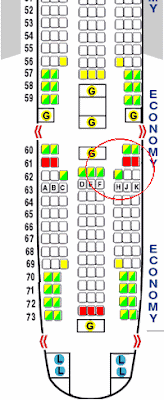 Wondering what’s going on in Thailand at the moment?
Wondering what’s going on in Thailand at the moment?
Clare and I have received countless messages, texts and emails asking if we are safe from Thailand’s chaotic current political situation.
In a nutshell, there has been some violent and aggressive protests happening at the moment, with a group trying to oust an apparently corrupt but recently elected government, all in the name of democracy. There has been at least one reported death and 48 people injured from the protests.
To be honest, I haven’t seen much of it. I’ve merely felt the subtle shockwaves emanating from the protest’s epicentre about 6kms north of the area where we live and work – mainly in the form of reduced traffic, lunches with Clare (she had a couple of days off) and an increasingly crappy exchange rate.
The issue has undoubtedly been the talk of the town over the last couple of weeks, and with international reports covering the more outrageous of protest scenes, Thailand’s image is suffering immeasurably.
Amidst all of the images of machetes, marble guns and military, how can we distill what really is happening???
Well, I started to pull together my take on the events thus far…halfway through I read an article courtesy of The Economist which came out today. The article provides an excellent analysis of the current political environment and perfectly sums up my views on the situation. Here’s a slightly cut down selection:
WORSE THAN A COUP
Sep 4th 2008
An authoritarian rabble should not be allowed to turf out a deeply flawed but popularly elected government
STANDING up for democracy sometimes entails standing up for some unappealing democrats. Thailand’s pugnacious prime minister, Samak Sundaravej, is an especially hard man to defend. A ferocious rightist, Mr Samak was accused of inciting the policemen and vigilantes who slaughtered dozens of unarmed student protesters in Bangkok in 1976. On becoming prime minister following the election last December that restored democratic rule after a 2006 coup, Mr Samak chose for his cabinet some of the most unsavoury figures linked to the government of Thaksin Shinawatra, the prime minister deposed in the coup. But with the army on the streets of Bangkok again, Mr Samak is for once, if not in the right, then at least less wrong than those calling for his head.
His government is deeply flawed. But it would be wrong and dangerous if the authoritarian rabble who have seized Government House in Bangkok forced it out of office. After violent clashes between supporters and opponents of the government, Mr Samak this week declared a state of emergency in Bangkok.
If the protesters, the woefully misnamed People’s Alliance for Democracy (PAD), do succeed, democracy in Thailand — not so long ago a beacon, by Asian standards, of pluralistic politics — will be in grave danger.
PAD...argue that the rural masses who favour Mr Thaksin and Mr Samak are too “ill-educated” to use their votes sensibly. This overlooks an inconvenient electoral truth: the two prime ministers had genuinely popular policies, such as cheap health care and credit.
The palace and a Burmese road to ruin
As in the build-up to the 2006 coup, PAD leaders are trying to oust a popular government on the bogus pretext of “saving” Thailand’s revered King Bhumibol from a supposed republican plot. Some of the PAD protesters reportedly believe their sit-in has the crown’s tacit backing.
In the official version of modern Thai history, the king is the great defender of peace and democracy, who comes to the rescue at moments of crisis. Now would seem to be one such moment: some wise words from the king could do much to defuse tension.
Thais like to believe they are good at seeking compromise to avoid conflict. But there has been little sign of compromise in the past three years, and there is now the risk of a bad one.
It’s really just a case of which is the lesser of two bad situations – stick by a democratically-elected, but corrupt, government representing the views of the majority of Thais; or dissolve Thailand’s fragile democratic foundations by bowing to the violent and stubborn demands of a large minority group trying to gain influence in a seemingly corrupt political environment.
 I’ve found the holy grail of overseas airline travel.
I’ve found the holy grail of overseas airline travel.

